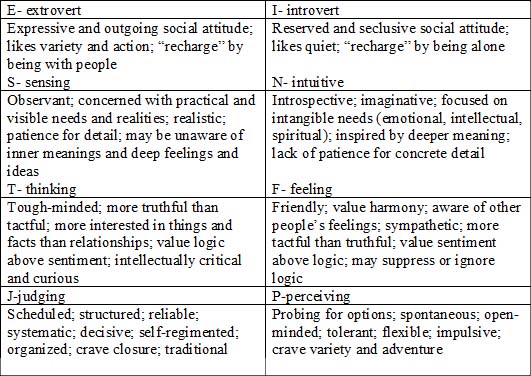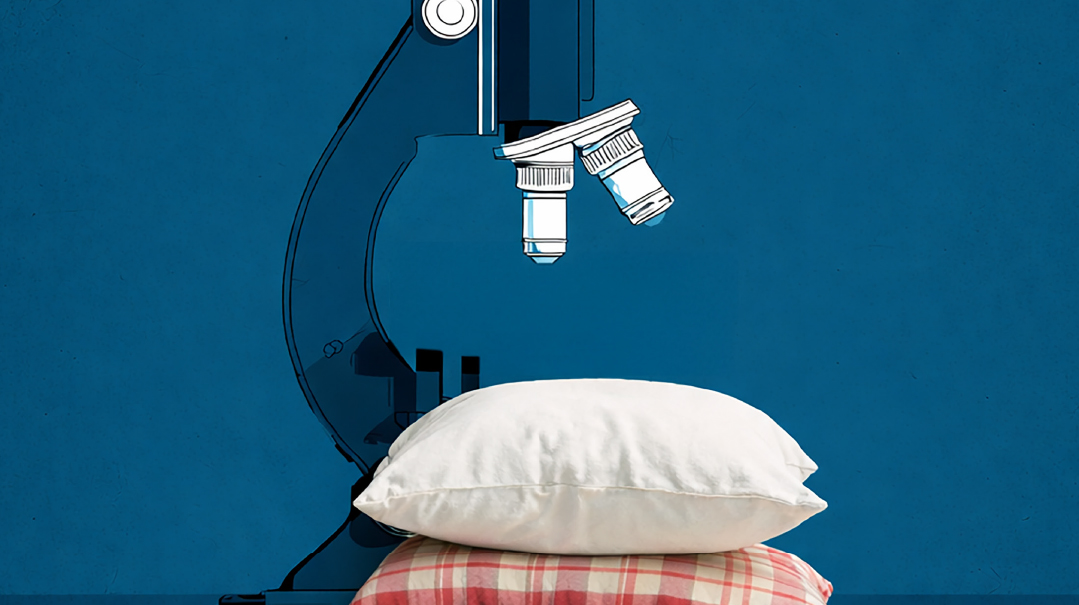Decoding Your Nature
| May 11, 2011Why do you act the way you do? What makes you so unique? Personality type systems can help you delve into these questions — and teach you a lot about everyone else in your life

“I’m an ESFP. What are you?”
“Oh, I’m an INTJ. I’m also a 4.”
To the uninitiated, this type of dialogue can seem like some sort of confusing code language. But for people who are familiar with personality type systems, these letter combinations and numbers are the key to gaining a clearer and deeper understanding of yourself and others.
Identifying Character Traits
You may have never heard of personality type systems, which methodically divide people into separate categories based on individual temperament. But, in fact, these systems are quite popular. And for good reason — it’s hard to resist the idea of a cheat sheet that can help you better understand your nature, from what motivates you to what makes you act in a particular manner.
The idea that there are distinct, innate differences in temperament actually dates back to ancient times. The Greek philosopher Plato was prominent among those who proposed four categories of people, each of who contribute to society in a unique way.
In more recent times, you might say that Swiss psychiatrist Carl Jung is the father of personality type systems. In the 1920s, he suggested that people perceive and react to situations differently because they’re compelled by distinct, inborn personality traits.
The Myers-Briggs personality type system, created by the mother-daughter team of Katharine Briggs and Isabel Briggs Myers, is an interpretation of Jung’s work. There are four pairs of opposing personality traits, for a total of eight traits, each of which is designated by a particular letter (see sidebar, “Which Type Are You?”).
Since then, numerous other personality systems have been developed. Psychologist David Keirsey created a variation of Myers-Briggs, called KTS-II, which focuses on four central temperaments. Another personality model, titled the “Big 5,” is arranged along similar lines, but includes an additional component to measure for emotional stability. The Enneagram, which supposedly stems from ancient origin, is a popular number-based model that includes nine basic personality types.
Love Thy Neighbor
Skeptics might pass these personality type systems off as just plain silly, but fans argue otherwise. “They help you understand why people are different from you,” says Rachel Landesman.* “You realize that people have different kochos and that’s not a good thing or a bad thing. That was a revelation to me. It helps you appreciate people more.”
Adds Rina Goldman,* “It’s natural to assume that most people function like you do.” But in reality, they don’t. And when we interact with contrasting personalities, what goes on in our heads isn’t so pretty: “We instinctively account for differences in others not as an expression of natural diversity, but in terms of flaw and affliction: others are different because they are sick, or stupid, or bad, or crazy,” explains Keirsey in his book Please Understand Me II.
Personality type systems can help counter these knee-jerk reactions. They “open your mind” says Rina, and provide “a mechanism for understanding others.”
A relative of mine once intoned, only half joking, “Expectations are the root of all evil.” They’re especially dangerous because they’re often based on how we would react to something — which can be the exact opposite of how our spouse or child might respond to the same situation. Using personality type systems to understand how people are different can help us eliminate (or at least lessen) unrealistic expectations and develop greater tolerance.
For example, Rachel’s husband is far more scheduled than she is. “He needs to leave for a flight a half hour earlier than I would need to leave,” she notes about this “J” side of his personality. Understanding this character difference has allowed her to accept her husband instead of thinking, “You’re nuts for wanting to be there so early.”
Knowing that people behave the way they do because they’re predisposed to particular behaviors can have a mind-altering impact on your feelings and performance in relationships. As an insightful teacher of mine noted, “If you’re walking on a street and a car drives by and, as a result, a rock flies up and hits you in the face, you’ll feel very differently than you would if an Arab picked up a rock and threw it at you.” Although the physical pain is equal in both scenarios, the emotional reaction is very different. If we can view the behaviors of others as manifestations of their innate personal issues, which are not intentionally aimed at hurting us, it can greatly enhance our emotional health.
Love Thy Self
If you’re naturally shy and you find out in a personality test that you fall into the “introvert” category, it probably won’t come as a big surprise. But the knowledge can still prove useful. For people who feel misunderstood or unappreciated, discovering the differences between personality types can be very reassuring.
“I remember reading about introspective types (N) and finding it very comforting because it helped explain why certain people were not on my wavelength,” relates Rachel. Once she realized that her personal tendencies were a natural part of her self-portrait, she was able to accept herself with greater ease.
Adina Feld* had a similar experience: “With friends and school, it gave me more confidence in myself. I understood that this is who I am.”
Accepting yourself can also help you avoid the trap of aspiring to be someone you’re not — and instead build on your unique strengths. “A close friend of mine is an ‘ESFP,’ the type of mother who is always on the go,” says Ahuva Brown.* “She seems to have boundless energy to run with her kids to museums and activities. Her home is a social hub, open to neighbors and friends who come and go, filled with the smell of home-baked goodies. For a while, it was hard for me to accept that her type of mothering was a particular style with which I was not required to compete.”
Once her own children grew older, Ahuva realized that as an “INFJ,” she had an intuitive knack for understanding how to deal with her kids in an exceptionally perceptive and balanced manner. “I realized that my lower-key personality provided me with a large dose of patience,” she says, “and my greater predictability allowed me to provide important structure that my children thrived on.” She was finally able to appreciate that she and her friend had different emphases in their parenting, each utilizing their particular strengths.
The Mussar Approach
“One who wants to educate himself, must first know himself,” writes Rav Shlomo Wolbe in Alei Shur. “And there is nothing more difficult than knowing oneself, his good and bad middos and his subtle predispositions … It is like trying to cure the sick person without recognizing the nature of his illness.”
Gaining this level of self-knowledge can take a lifetime, but personality type systems can give you a jump start. “I found it helpful when I recognized unhealthy characteristics of my personality and saw I could change,” says Rina. “It was very growth-oriented.”
Once you figure out your core personality, you can focus on fixing a flawed trait — or taking a positive one to the next level. In Sifsei Chaim, Middos and Avodas Hashem, Rav Chaim Friedlander explains that every middah has a dual aspect: Chomer is the raw material of a middah, basically what you’re naturally born with. Tzurah is the developed form of a middah. It refers to the degree to which one develops a particular character trait. Tzurah can be more maturely developed and appropriately guided than the raw form of the middah.
Take, for example, Leah, who is a natural giver. She’s the type that’s always rushing to visit the sick and volunteering to organize relief for those in need. She feels an internal push to help everyone as much as she can — this is chomer. Dina, on the other hand, is very inner-directed. It’s much harder for her to maintain the dynamic focus on others that seems to come naturally to Leah. Over time, with real effort, Dina can come to develop her own chesed drive. For example, she can figure out how to use her natural sensitivity to hone in on people’s unspoken needs, as well as determine when to put her family before chesed projects. This careful cultivation of a trait is tzurah.
How far can one stretch? “The statistics seem to indicate that people can stretch their personality 20 percent to 30 percent away from where they are,” notes Dr. Miriam Adahan, a psychologist and author whose books Appreciating People and Awareness address the topic of self-acceptance and personality type. “Self-growth is like lifting weights in the gym. You are the only one who can know your personal limits. You need to be aware that working on something that isn’t natural to you is always awkward, like writing with your left hand.”
The Relationship Equation
Sara Gordon* was on a date when she first learned about personality type systems. “I was dating a guy who went to business school and he had learned a personality system as a tool for talking to people on their wavelength and building rapport in order to be successful in business. He described the system, but I didn’t get it, and I was very resistant to him trying to figure me out,” she admits. “Later, I took a test and I got an ‘ENFP.’ When I read the description, I was blown away. In terms of self-discovery and self-awareness, it was incredible.”
Her appreciation for these systems didn’t end there; today, she considers them an important shidduchim tool. “Dating itself is a medium for discovering a lot about yourself,” she says. With this perspective in mind, she is able to “go into dates consciously trying to learn something about myself and how I interact and react to different situations.”
“Personality type systems can help you understand why you gravitate to certain people more than others,” adds Adina. This may be precisely why Rifki Eichorn, a shadchan, uses her close familiarity with personality type systems in order to match prospective dates. “It’s not only the particular letters of an individual,” she explains. When she meets someone and asks them questions about themselves, she’s able to piece together a picture of their preferences and attitudes.
As a general rule, Rifki says, “I see that intuitive types need intuitive types and sensing types need sensing types.” Using these systems, her matches are usually right on target. “Although other things can be wrong, I know they will get along in certain ways,” she explains.
Matching like with like based on personality type can also help singles avoid the “opposites attract” pull, which often produces a lot of conflict. “I know a couple where she loves to bake and have neighbors around and her husband wants his space, his quiet, and a neat, clean house. This makes things very difficult,” Dr. Adahan says. “It’s like trying to fit the wrong size shoe onto your foot.” She adds that “Sforno says you should marry someone similar to yourself.”
Of course, there are those who marry individuals with very different personalities and have wonderful marriages. This was the case with Adina’s parents: “I think the fact that my father appreciates my mother’s personality makes a big difference.”
“If there’s acceptance and love it can work,” affirms Dr. Adahan.
The Critique
The study of personality type systems, otherwise known as personology, has been subject to critique in the academic field of personality psychology. Although studies have been conducted on some of the systems, the fact that personology relies primarily on hypothesis and observation excludes it from practical use in scientific diagnostics and research. Popularly, however, the systems are widely and effectively used for personal growth, relationship awareness, and professional development.
But the potential pitfalls of these systems are worth noting. Blumie Balkind, LCSW, has experienced much personal benefit and insight from personality tests. Yet, she explains, as with anything, “there can be drawbacks. It’s an easy way to pigeonhole people.” Although the systems are “supposed to help you not to judge people,” they can be used inappropriately for just that purpose.
At other times, the problem has less to do with labeling others than with tagging ourselves. “People sometimes use it as a crutch,” explains Rifki. You’ll think, “I’m a little lazy to do laundry but that’s how I am. That’s my personality profile,” while watching crumpled piles of laundry grow from a comfortable vantage point on the couch. It takes courage to accept oneself while refraining from using that as an excuse for undesirable behavior.
Another complaint is that the letters and numbers sometimes seem like a secret language to the uninformed. Exclaiming, “Oh, you’re an ENTP?” as you trade letters can be irritating to those who are unfamiliar with the system. One woman relates her husband’s reaction to her discussion of personality types: “Oh no,” he groaned, “you’re not going to start talking in code again, are you? I’m a ‘QRPO’…,” he mimicked, laughing.
Nature Vs. Nurture
There’s also the question of how much our personalities are dictated by our nature — and how much is determined by nurture. Although people do react to situations because of their inborn traits, they can respond to situations just as instinctively as a result of how they were raised.
Interestingly, a person can be totally blinded to an innate trait if they grew up with a parent or sibling who had a more pronounced form of the same characteristic. For example, Rachel describes her mother as “very, very emotional.” As a result, “I always considered myself very unemotional because I don’t wear all me feelings on my sleeve. When I got married, I realized that I’m a lot more emotional than I realized. My mother once saw me interacting with my baby and she said, ‘I never realized that you’re so affectionate.
The desire to conform to our environments can also make it harder to see our true selves. “Growing up with a very laid-back mother, as well as my closest friends, who were extremely spontaneous, I thought I was like them, just a bit quieter,” says Ahuva. “I don’t know how it is that I didn’t really recognize my need for structure and predictability. Perhaps I was afraid that I would seem too rigid in contrast to my surroundings.”
After Ahuva got married and was able to arrange her home in her own style, she became aware of what her real tendencies were. “My mother was baffled when I requested the recipe for potato kugel. ‘You just peel potatoes, add an onion or two, and feel the mixture to see if you have the right amount of oil and eggs.’ ‘Until it’s ready’ was the standard baking time for most dishes. She seriously thought I was a little weird.” A very different sort of cook, Ahuva measures out each ingredient and sets a timer for all cooking and baking.
Although personality type systems can be helpful, figuring out how we’re all different shouldn’t be the end goal. One writer put it best: “It is not our differences that divide us. It is our inability to recognize, accept, and celebrate those differences.”
* Name has been changed.
WHICH TYPE ARE YOU?
There are numerous personality tests you can take, but just to show you a sample system in brief, here’s what’s the 4 pair/8 letter Myers-Briggs system looks like:

Putting it all together: A sampling of personality types
The Social Butterfly – ESFP
You are outgoing, friendly, and very aware of your environment.
You are tolerant and easygoing.
You have no use for theories — you prefer firsthand experiences.
You are spontaneous and playful, with a love for life, people, and material comforts.
You are practical and effective in getting what you want.
The Executive – ESTJ
You are dependable, thorough, and persevering.
You are organized and decisive, making sure that things get done efficiently.
It is important to you that everything be kept in its proper place, be closely supervised, and thoroughly inspected.
You are conservative, realistic, and matter-of-fact.
You are observant and forceful in implementing plans.
The Sensitive Soul – INFP
You are introspective and intuitive.
You dislike conflict and focus on nurturing a positive self-image in your loved ones.
You are enthusiastic and creative, dreaming about how to give meaning and wholeness to people’s lives.
You are flexible and adaptable unless your values are at stake.
The Independent Thinker – INTJ
You are intellectual and independent, focusing on being consistently rational in action and speech.
You favor abstract, theoretical, and complex ideas.
You are curious and inventive.
You are systematic, competent, and efficient in tackling problems.
(Originally featured in Family First, Issue 240)
Oops! We could not locate your form.





